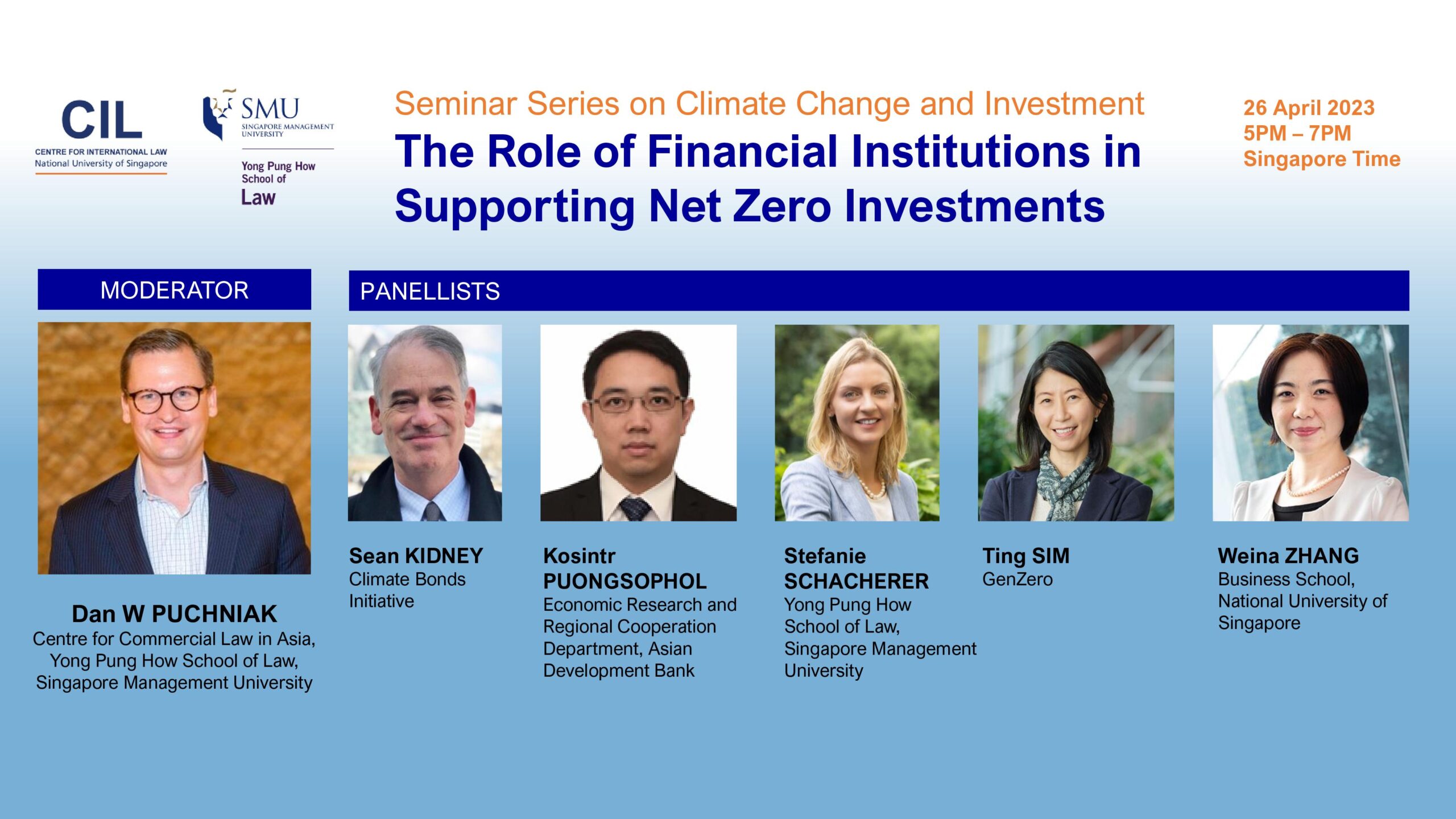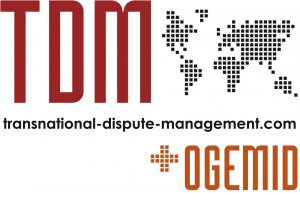Venue
Start
End
Time
Seminar 4 of 5
5:00 pm – 7:00 pm (SGT) / 9:00 am – 11:00 am (GMT) / 10:00 am – 12:00 pm (CET)
Upcoming webinars https://cil.nus.edu.sg/seminar-series-on-climate-change-and-investment/
What This Seminar is About
Financial institutions play a crucial role in mitigating climate change by supporting net zero investments and promoting the adoption of low-carbon technologies and infrastructure by corporations and countries. This can be achieved through various methods, such as incorporating sustainable criteria into underwriting practices and adopting sustainable investment classifications.
This seminar is the first in collaboration with Singapore Management University. It will explore the role of financial institutions in climate actions and their impact on aligning investments with the targets and goals of the Paris Agreement. With a focus on the Asian context, the seminar will discuss the role of financial institutions, including banks and institutional investors, and feature experts from the financial sector, corporates and academia. The challenges and opportunities that financial institutions face in transitioning towards a net zero future will be delved into. The seminar will also examine the role and impact of relevant regulatory frameworks, industry benchmarks and voluntary standards. Through this discussion, we aim to facilitate a meaningful exchange of ideas and experiences that will help drive the transition towards a more sustainable future.
Seminar 4 is co-organized by the Centre for International Law, National University of Singapore and the Yong Pung How School of Law, Singapore Management University.
PROGRAMME
Welcome Remarks
- N Jansen Calamita
(Head, Investment Law & Policy; Centre for International Law; Research Associate Professor, Faculty of Law, National University of Singapore)
Moderator
- Dan W. Puchniak
(Professor of Law; Director, Centre for Commercial Law in Asia, Yong Pung How School of Law, Singapore Management University)
Panellists
- Sean Kidney
(Co-founder and CEO, Climate Bonds Initiative) - Kosintr Puongsophol
(Financial Sector Specialist, Economic Research and Regional Cooperation Department, Asian Development Bank) - Stefanie Schacherer
(Assistant Professor of Law, Yong Pung How School of Law, Singapore Management University) - Ting Sim
(Legal Director, GenZero) - Weina Zhang
(Associate Professor of Finance, Business School, National University of Singapore)
Background to the Seminar Series on Climate Change and Investment
The CIL Seminar Series on Climate Change and Investment comprises six seminars examining how international law can serve as a tool to support Paris-aligned investment flows. Under Article 2(1)(c) of the Paris Agreement, states have committed to strengthening the global response to climate change by, inter alia, “making finance flows consistent with a pathway towards low greenhouse gas emissions (GHG) and climate-resilient development.” It is hard to overstate the magnitude of this ambition, essentially requiring the wholesale adjustment of state economic regulation and private sector investment approaches across the globe in order to limit financial flows to carbon-intensive activities and redirect those flows to Paris-aligned ones.
The series focuses broadly on Asia. Not only does Asia account for approximately 60% of the world’s population but it is also the main GHG-emitting region in the world, accounting for approximately 50% of global CO2 emissions per year. Moreover, compared to regulatory and treaty reform discussions in Europe and North America, the situation in Asia is often overlooked. To that end, in this series we ask broadly what role states in Asia can play in creating solutions, whether through the leadership of economic blocs like ASEAN or larger economies like China, India, Japan and Korea. Moreover, we also ask whether states in Asia are willing to lead in this space.

 Transnational Dispute Management (TDM, ISSN 1875-4120) is a comprehensive and innovative information service on the management of international disputes, with a focus on the rapidly evolving area of investment arbitration, but also in other significant areas of international investment (such as oil, gas, energy, infrastructure, mining, utilities etc).
Transnational Dispute Management (TDM, ISSN 1875-4120) is a comprehensive and innovative information service on the management of international disputes, with a focus on the rapidly evolving area of investment arbitration, but also in other significant areas of international investment (such as oil, gas, energy, infrastructure, mining, utilities etc).
It deals both with formal adjudicatory procedures (mainly investment and commercial arbitration), but also mediation/ADR methods, negotiation and managerial ways to manage transnational disputes efficiently. See here for more information. You can apply for a free OGEMID trial membership and students can sign up for Young-OGEMID (which is free).

